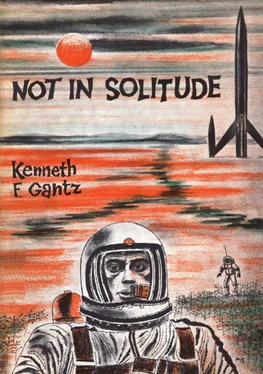“Lock him up,” Major Noel ordered. “And strip him clean of any metal he’s got on him.”
Dane stared up at him. “What the hell goes on with you!” He tried to make sense out of things, wondering at the hard plates he sat upon.
When he remembered the blow, he got up on his feet and surged at Noel, fighting against the weight of the two heavy men hanging onto him.
“I don’t like a damn murderer,” Noel snarled. “Especially when he tries to murder my own commander.”
Through his hurting temper to beat the man down, Dane saw him dimly. “Colonel Cragg?” he heard himself say thickly. “You mean Colonel Cragg? He dead?” he added ungrammatically.
“You ought to know, damn you!” Noel shouted. He shoved at Dane’s shoulder. “Get the hell to your bunk. I want to see you tied down and out from underfoot.”
Dane conquered the urge to strike at him with the chain they had strung between his wrists. “How did I do all this?” he demanded. “Who made you the judge and jury?”
Noel turned on his heel and began to mount the ladder. Captain Spear and Jerves shoved at Dane, pushing him along the narrow corridor to his bedroom, thrusting him against his bunk while Jerves pulled the gravity boot off his right foot and snapped a leg shackle around the ankle and then around the rod that anchored one corner of the bunk to the deck. Then they took off the wrist irons and locked him behind his own door, doubly bound within the four-foot radius of his chains.
His weariness was sudden and refused to cope with it, riding even over the indignity of the restraint. He was leg-weary, arm-weary, back-weary, and mind-weary. The hours since he had lain on the bunk stretched behind him into far memory. He counted them vaguely while he got out of his clothes, momentarily wondering what they had expected to find on his person. Since 0600 Wednesday to 1930 Friday. Not counting the long sleep in the lichens and the shorter one on the red sands, it was nearly seventy-two hours. Six dozen hours. He grimaced. Sounded like a crate of eggs. A lot of eggs.
He put it off, all of it, until tomorrow. Except maybe signals. In two minutes he was asleep.
LIEUTENANT YUDIN didn’t like to mull over his experience on the observation deck, but he couldn’t dismiss it. Even if he had been tricked.
It was 2100 hours. Throughout the Far Venture the Air Force crew stood their posts sharply, but under the ordered discipline, Lieutenant Yudin knew, things were in an uproar. The civilians, he observed with a faint distaste, knotted in gossiping all-civilian huddles with even more than their usual gregariousness. Still he would have joined one of their groups that flowed together, then dispersed in favor of a new combination, if it were fitting for him to discuss the casualty, his commander, with them. Though he scarcely knew any of the men, he would not really mind a word or two about the colonel, if he might in turn talk about Dane and find out what they really thought of him and his signals. The civilians were important in their fields, most of them, and he would like to tell them about the phony signals and get their reactions. They were an aloof and casual bunch, though, not concise and mannerly like the military. He felt that they looked upon the crew with supercilious and secret amusement. Civil but always smiling about it.
After a while he packed his small hand tools with neat order and took them out of his little workroom. He climbed with some difficulty up the ladders to the observation deck. There he stood for a long time, looking at the photo plane table and trying to make up his mind. Finally he laid out his tools and began laboriously to disassemble the apparatus. For an hour he took down tubes, condensers, transistors, and impedances. He traced wiring and hunted for inductive taps. He searched the cabinet, the stand, the surrounding deck, the backboard. He went below to the next deck and painstakingly examined every inch of the ceiling. He found nothing. But somewhere was the source of the interference. It had to be somewhere, but on his own he couldn’t go over the entire spacecraft, crammed with apparatus and each instrument zealously watched by someone or other of the specialists.
It was a foggy mess. One way or the other he had a duty. If Dane had gulled him, he had done it for a reason. If he could figure it out, it would all tie in with the stalled drive and the attempt to kill Colonel Cragg. If they really were Martian signals, that was a hell of a big thing, too, requiring the full and careful attention of the commander and his staff. He grimaced at the thought of going even to Major Noel with an unsupported story of signals from an uninhabited planet. But it was plain that he had a duty and a responsibility that now ran far beyond his assignment as electronics engineer of the Far Venture.
He thought of getting them to let him in on Dane for a little quizzing, but then he was unable to think of anything he might get out of him if he did. He went down to the main deck to his own bunk and lay across it, dozing a little, not thinking things out as he had intended to do, until he was brought wide awake by the three long buzzes and the three short of officers call on the intercom speaker. It was immediate assembly.
He hurried around the circular main deck and climbed up to 1-high deck and the command post. Captain Spear and Major Isbell, the astronavigator, were ahead of him.
Major Noel looked at him coldly. “Where’s your sidearm, Lieutenant?”
Yudin was not quick enough to prevent his hand from straying ineptly toward where his shoulder holster should have hung.
“You are aware that officers and crew are to wear sidearms at all times while the spacecraft is at rest on this planet, aren’t you?” Noel prodded.
“Yes, sir,” he mumbled, realizing that he had not answered smartly. “I was asleep.” He should not have added the excuse; he knew that, too, as soon as he had uttered it.
Noel turned from him contemptuously.
Major Beloit, the engineering officer, came up the ladders with his assistant, Captain Schofield, followed by Lieutenant McDonald and Captain Finerty, the supply officer.
When the officers had assembled, Noel led off. “Finerty, what did you find?”
“One’s gone, sir.”
Noel pursed his lips, nodding as if the reply were laden with profound wisdom. The conceited ass is play-acting, Yudin told himself. Now the airmen get blamed for it again. Why doesn’t he accuse the civilians? They can get at the stores as well as the crew.
“Pembroke has disappeared from the medical room,” Noel said deliberately, dwelling on each word and waiting for his effect. “Captain Spear and Major Isbell have made a preliminary search of the ship without success. Captain Finerty now reports that a pressure suit is missing. It looks as if Pembroke has slipped outside. On the other hand, maybe he removed the suit and hid it to fool us.” His look sharpened. “I want a thorough search of this entire ship. I want every locker and storage space looked into and all stores and equipment searched through. In other words, if he is aboard, find him. Watch yourselves and caution the crew. He may be dangerous.”
They all waited to see if he had anything to add. He’s got them, Yudin thought. He not only assumed command as senior officer, he really is the commander.
Major Beloit spoke up. “He must be off his beam. How about the others?”
“Still unconscious,” Noel said. “Still in the hospital.”
“You think maybe…?”
“I don’t know,” Noel interrupted him. “It’s possible. We don’t know for sure how long he’s been gone. Captain King checked on his condition at 1600. He was there then. Still out, according to King.”
Yudin looked at the flight surgeon. King was the assertive sort he had no confidence in. Pembroke could easily have fooled him. Chances are he looked in, felt his pulse, and went back to a drink and a nap. Trust a medic to provide for himself.
Читать дальше












